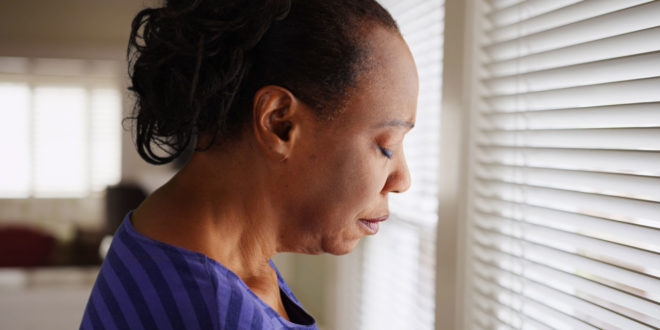His life had been full and challenging. He had been blessed with a wonderful wife, great kids, and a lucrative and respected profession. He knew he was the same man, and yet he was not. Men had once sought him out for advice and counsel. Now no one came to him for any opinion or observation, and most of the time, even his family treated him as if he couldn’t possibly have anything interesting to share. They seemed to talk down to him or “over his head” as though he were a small child.
He remembered his prized Pontiac and miles of joyful driving. He also remembered the day his kids declared his driver’s license had to be taken from him, a decision in which he had no voice. And why did they also feel he could no longer handle his finances and manage his checkbook?
His beloved wife had died, and the family home was eventually sold. He felt the loss of many dear friends who were no longer near. His diminishing good health had brought him to this place and this wheelchair and these solitary hours of remembering.
The Devaluation of Aging People
Is this a realistic picture? Does this scenario play out in countless ways in our culture today? Can the aging process possibly bring so much change and pain? Are we blind to this time of tremendous transition in so many areas for our dear seniors?
In our day there is a noted increase in the numbers of the old. A wise remark made by Michael Philbert throws light on the problem. “What makes growing old socially, economically and politically important is not the multiplication of the number of old people, but the fact that this multiplication is taking place in a society which looks upon the devaluation of the old as being a law of nature, instead of seeing it as a feature of its own culture.”1
That “feature,” or prejudice, if you please, is the absurd idea that the old are good for nothing, and instead of making adequate use of their services, they are often thrust into idleness, solitude, and alienation.
Look Closer and Relate
But look closer. “That old man or woman has a mind which suffers and feels pleasure, a mind which thinks and feels. It is a mind fashioned by the multitudinous experiences of a long life, its successes and failures, its joys, and disappointments. It is unique because it is the accumulated experience of a unique life. They hide this unique mind of theirs because they feel that no one is interested in it, because they think that what they would say about their lives is of no interest to anyone, because they do not feel themselves to be loved.”2
So how can you lovingly relate to the aging people in your life–when compassion and understanding are difficult to give because of their changing personalities or perhaps other stress factors?
Let me share four suggestions that could be profitable in your particular situation.
1. Listen carefully, respectfully, caringly, compassionately, and believingly.
Even though you’ve heard it all countless times before (and know it by heart), hear it again. And listen as though it were important stuff because it is? It’s their perspective on things, confused and cloudy though it may be. Offer the gift of your respect and affirm their comments—even the ones that are “off the wall.” Draw close, look intently into that wrinkled face, and let them feel that you are really hearing them. One of the ways understanding is conveyed is by listening without judgment, proclamation, or lecture.
Paul Tournier shares this beautiful paragraph from his book Learn to Grow Old. “If an old man sees that you are really interested in his personal life, you will see a wonderful transformation take place in him. His eyes that seemed dull will light up with a new fire, and his face will come alive with unexpected emotion. He felt that he had been thrown on the scrap-heap—and all at once, he comes to life again, becomes a person once more. Just like a child, the old man needs to be spoken to and listened to in order to become a person, to become aware of himself, to live and grow. You will have brought about something that no social service can ever do of itself: you will have promoted him to the rank of person.”3
2. Affirm Self-worth
As a volunteer hospital chaplain dealing with the dear elderly, I hear this comment every day, “I can no longer do the things I used to do. My life doesn’t seem to count for much.” This is always expressed with a genuine sense of loss.
The changing, aging process has done its work. The banker no longer goes to the bank, the professor no longer teaches, the housewife can no longer prepare delicious meals and manage a home. The musician can only listen to beautiful music—he can no longer produce it.
Those of us who are still actually working and employed are seldom sensitive to the loss and vacuum the aged feel when they are no longer productive in their life’s work. And if during their working year their sense of self-worth is hinged on their productivity, on what they do and how well they do it, chances are when that work is no longer possible for them, they do not sense how exceptional and important they still can be.
In His Image
Spend time assuring that aged person in your life that he or she is still made in the image of God and that all life is holy and is a gift from God. “Man’s value is judged not by what he does or has done but by what he is; not by his past position or title, but by his personal maturity, by his breadth of mind, by his inner life and the quality of his love for others.”4 Old age can be a time of larger love and compassion, of attitudes of goodwill and thoughtfulness towards others.
Do Not Lose Heart
A thought in the book Soulful Aging reminds us that “There is no condition of mind or body in which I cannot in some way, in some fashion or manner practice some form of love for God and man.”5 Perhaps this action will pass unnoticed save for a very few, or the chance individual who may benefit from it. But it is known to God; it is part of His divine operation on earth. This truth should be impressed upon the heart of every aging, even frail, person.
In 2 Corinthians 4:16, we are reminded, “Therefore do not lose heart. Though outwardly we are wasting away, yet inwardly we are being renewed day by day” (NIV). There may be pain, there may be weakness, medications may be needed for numerous physical ailments. The outer body really needs help! But the inner body—our compassion, our sense of humor, our generous spirit, our concern for others’ welfare—these qualities of the inner man can be maintained and cultivated. Good news for the aged!
3. Laughter has healing power and never fails to lighten the heart at any age.
But often, the tremendous changes and losses in the lives of the aged seem to diminish their capacity for genuine, heartfelt laughter.
Someone has said, “I believe that as long as we are not in a state of shock, there is always something to laugh about.” Can you help that aging person in your life to find that “something”? Can you use humor with a sensitive spirit to revive laughter that has been lying dormant, just below the surface? As a caregiver or friend, can you free yourself from the day-to-day stress by stepping back, seeing the situation for what it is, and enjoying the release of laughter?
Creating Laughter
Draw up a chair. Involve your senior-ager in a funny story, perhaps from their past, their childhood. Encourage them to recall the humor in different situations. Repeat a crazy joke you’ve heard, emphasize the punch-line and repeat it again, if necessary! No success today? Try again tomorrow. Create the laughter.
Steve Wilson, a humorologist and clinical psychologist, observes, “Laughter doesn’t take the tragedy and disappointment out of life, but for a moment gives us another way of looking at it and helps to get us through situations that might otherwise seem completely unbearable.”6
As a chaplain, I see patients every day whose faces are drawn and care-worn. Not much joy in the room. I consider it my privilege to endeavor to lighten that mood and even invoke laughter between us. If I can do that, I consider that visit effective even though spiritual truths and insights may not have been an integral part of the conversation. Humor reminds us that there is more to life than just pain.
4. Touch is always available no matter the physical or emotional condition of your aging senior.
If the first three suggestions are not applicable for some reason, you may convey your love and care with the gift of touch.
Mother Teresa said, “The biggest disease today is not leprosy or tuberculosis, but rather the feeling of being unwanted.” The old often feel unwanted in our present culture. It’s a feeling of isolation, of being “outside” the circle of loving activity, perhaps ignored by important people in their life.
Many are starved to have someone touch them, to experience the warmth of another hand. It takes so little—the stroking of the arm, the smoothing of the hair, perhaps a kiss on the cheek or forehead. These are gestures expressing love and, most of all, acceptance. A simple human contact conveys more than an expensive gift or flowers. A genuine warm hug given without reserve will create a glow in the heart of your aged that will outlast the effectiveness of their morning pills.
Do these four suggestions really work? Hopefully. Will they fail in some situations? Probably. Will they require imagination, patience, and prayer-power to implement smoothly? Without a doubt. Are they worth a try? Always.
If you liked this, you might also enjoy Healthy Aging | Aging Well
1 Tournier, Paul, Learn to Grow Old, Harper and Row, 1972.
2 ibid
3 ibid
4 ibid
5 Simmons, Henry C., Soulful Aging, Smyth& Helwys, 2001.
6Klein, Allen, The Courage to Laugh, Tarcher/Putnam, 1998.
 Answers for Me Support & encouragement for every-day life
Answers for Me Support & encouragement for every-day life



